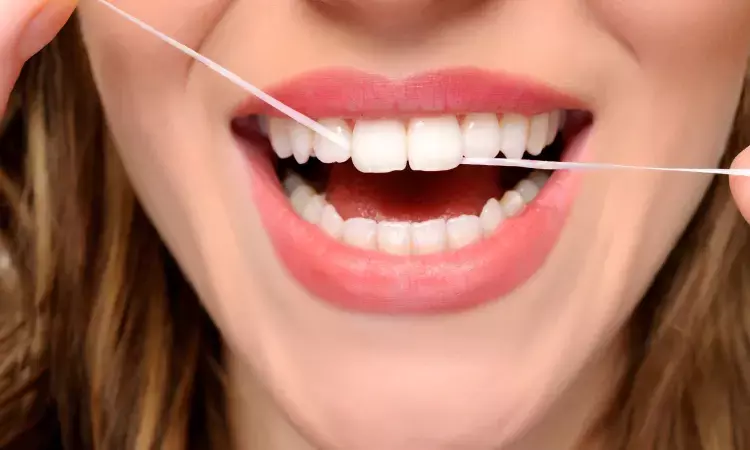- Home
- Medical news & Guidelines
- Anesthesiology
- Cardiology and CTVS
- Critical Care
- Dentistry
- Dermatology
- Diabetes and Endocrinology
- ENT
- Gastroenterology
- Medicine
- Nephrology
- Neurology
- Obstretics-Gynaecology
- Oncology
- Ophthalmology
- Orthopaedics
- Pediatrics-Neonatology
- Psychiatry
- Pulmonology
- Radiology
- Surgery
- Urology
- Laboratory Medicine
- Diet
- Nursing
- Paramedical
- Physiotherapy
- Health news
- Fact Check
- Bone Health Fact Check
- Brain Health Fact Check
- Cancer Related Fact Check
- Child Care Fact Check
- Dental and oral health fact check
- Diabetes and metabolic health fact check
- Diet and Nutrition Fact Check
- Eye and ENT Care Fact Check
- Fitness fact check
- Gut health fact check
- Heart health fact check
- Kidney health fact check
- Medical education fact check
- Men's health fact check
- Respiratory fact check
- Skin and hair care fact check
- Vaccine and Immunization fact check
- Women's health fact check
- AYUSH
- State News
- Andaman and Nicobar Islands
- Andhra Pradesh
- Arunachal Pradesh
- Assam
- Bihar
- Chandigarh
- Chattisgarh
- Dadra and Nagar Haveli
- Daman and Diu
- Delhi
- Goa
- Gujarat
- Haryana
- Himachal Pradesh
- Jammu & Kashmir
- Jharkhand
- Karnataka
- Kerala
- Ladakh
- Lakshadweep
- Madhya Pradesh
- Maharashtra
- Manipur
- Meghalaya
- Mizoram
- Nagaland
- Odisha
- Puducherry
- Punjab
- Rajasthan
- Sikkim
- Tamil Nadu
- Telangana
- Tripura
- Uttar Pradesh
- Uttrakhand
- West Bengal
- Medical Education
- Industry
A dental floss that can measure stress, reveals research

Chronic stress can lead to increased blood pressure and cardiovascular disease, decreased immune function, depression, and anxiety. Unfortunately, the tools we use to monitor stress are often imprecise or expensive, relying on self-reporting questionnaires and psychiatric evaluations.
Now a Tufts interdisciplinary engineer and his team have devised a simple device using specially designed floss that can easily and accurately measure cortisol, a stress hormone, in real time.
“It started in a collaboration with several departments across Tufts, examining how stress and other cognitive states affect problem solving and learning,” said Sameer Sonkusale, professor of electrical and computer engineering. “We didn’t want measurement to create an additional source of stress, so we thought, can we make a sensing device that becomes part of your day-to-day routine? Cortisol is a stress marker found in saliva, so flossing seemed like a natural fit to take a daily sample.”
Their design of a saliva-sensing dental floss looks just like a common floss pick, with the string stretched across two prongs extending from a flat plastic handle, all about the size of your index finger. The saliva is picked up by capillary action through a very narrow channel in the floss. The fluid is drawn into the pick handle and an attached tab, where it spreads across electrodes that detect the cortisol.
Cortisol recognition on the electrodes is accomplished with a remarkable technology developed almost 30 years ago called electropolymerized molecularly imprinted polymers (eMIPs). They work similarly to the way you might make a plaster cast of your hand. A polymer is formed around a template molecule, in this case cortisol, which is later removed to leave behind binding sites. These sites have a physical and chemical shape “memory” of the target molecule so they can bind free-floating molecules that are coming in.
The eMIP molds are versatile, so one can create dental floss sensors that detect other molecules that can be found in saliva, such as estrogen for fertility tracking, glucose for diabetes monitoring, or markers for cancer. There is also potential for detecting multiple biomarkers in saliva at the same time, for more accurate monitoring of stress, cardiovascular disease, cancer, and other conditions.
“The eMIP approach is a game changer,” said Sonkusale. “Biosensors have typically been developed using antibodies or other receptors that pick up the molecule of interest. Once a marker is found, a lot of work has to go into bioengineering the receiving molecule attached to the sensor. eMIP does not rely on a lot of investment in making antibodies or receptors. If you discover a new marker for stress or any other disease or condition, you can just create a polymer cast in a very short period of time.”
Accuracy of the cortisol sensors is comparable to the best-performing sensors on the market or in development. Bringing this device into the home and in the hands of individuals without need for training will make it possible to fold stress monitoring into many aspects of health care. Currently Sonkusale and his colleagues are creating a startup to try and bring the product to market.
He points out that while the dental floss sensor is quantitatively highly accurate, the practice of tracking markers in saliva is best for monitoring, not for the initial diagnosis of a condition. That’s in part because saliva markers can still have variations between individuals.
“For diagnostics, blood is still the gold standard, but once you are diagnosed and put on medication, if you need to track, say, a cardiovascular condition over time to see if your heart health is improving, then monitoring with the sensor can be easy and allows for timely interventions when needed,” he says.
Reference:
Atul Sharma, Saliva-Sensing Dental Floss: An Innovative Tool for Assessing Stress via On-Demand Salivary Cortisol Measurement with Molecularly Imprinted Polymer and Thread Microfluidics Integration, ACS Applied Materials & Interfaces, DOI:10.1021/acsami.5c02988
Dr Kamal Kant Kohli-MBBS, DTCD- a chest specialist with more than 30 years of practice and a flair for writing clinical articles, Dr Kamal Kant Kohli joined Medical Dialogues as a Chief Editor of Medical News. Besides writing articles, as an editor, he proofreads and verifies all the medical content published on Medical Dialogues including those coming from journals, studies,medical conferences,guidelines etc. Email: drkohli@medicaldialogues.in. Contact no. 011-43720751


